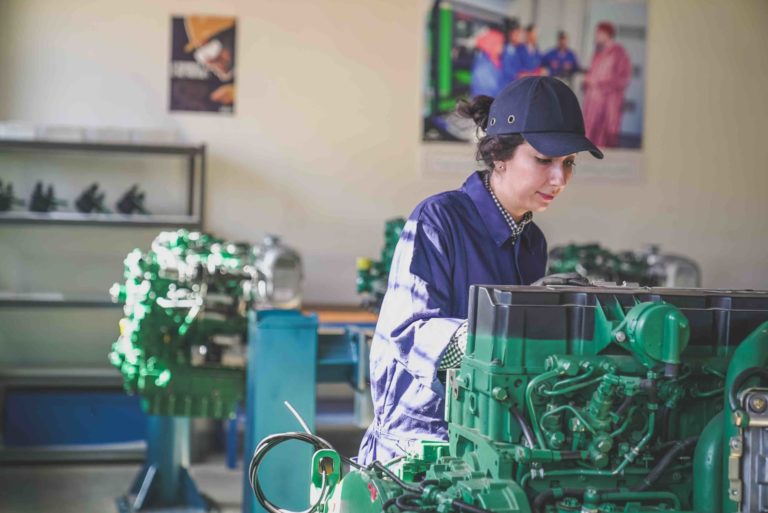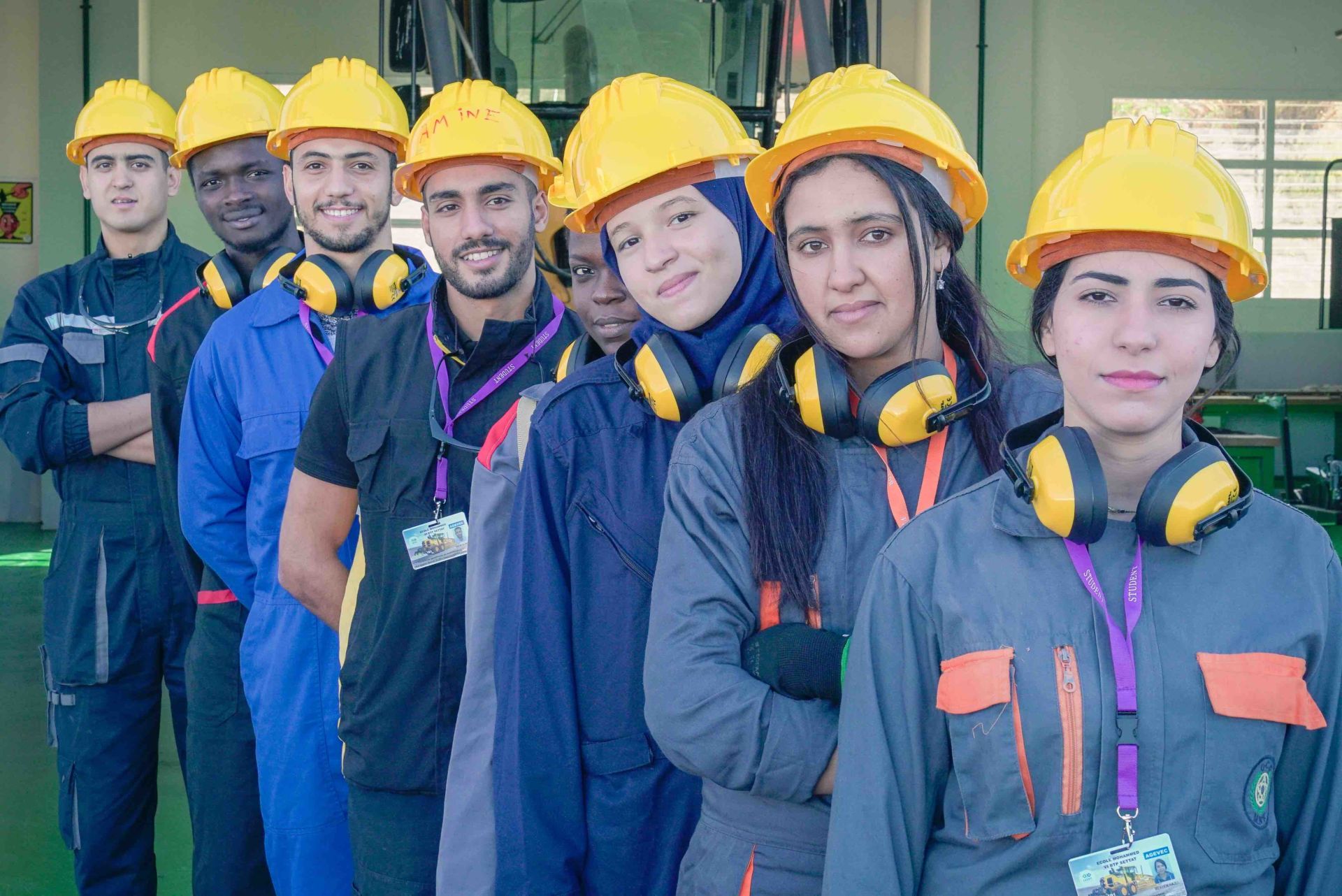Challenging social biases often require assiduous and consistent efforts. One must identify, be mindful, and critically engage to change social stereotypes, especially in gender-related matters in the world of work. Despite the substantial improvements made towards gender equality in the global workforce, women still suffer from a lack of participation in the market. According to the International Labour Organization (ILO), even though 70% of women worldwide prefer to work in paid jobs, only 49% are included in the labour force, compared to 75% of men. This gap can be even larger if regions are analyzed separately.
One way of confronting this condition is by promoting skills development programmes targeted to empower women. For International Women’s Day 2021, the Learning and Knowledge Development Facility (LKDF), an initiative by the United Nations Industrial Development Organization (UNIDO) and the Swedish International Development Cooperation Agency (Sida), launched the #LKDFWomenWeek. The LKDF engaged and interviewed eight UNIDO female colleagues to ask them one but important question:
How can skills development promote gender equality and empower women for inclusive and sustainable industrial development?
Digital Skills
There is no way around it. The digital age is here, and women need to invest in the relevant digital skills to have a more active role in the market. According to UN Women, in the context of the COVID-19 pandemic, women’s jobs are 19% more at risk than men’s, mainly because women are overrepresented in industries that took the hardest hit by the crisis. To secure a more sustainable and inclusive industrial growth and reduce the gender skills gap, developing the skills of the future is crucial. Lucia Cartini, Senior Coordinator at UNIDO’s regional coordination division for the Arab Region, points out that “the use of digital technologies, especially in times of pandemic, has become more and more important.”
Solomiya Omelyan, Programme Officer at UNIDO’s regional coordination division for Europe and Central Asia, argues that it is necessary to prioritize skills that are complementary to the technologies of the Fourth Industrial Revolution and cannot be easily replaced by machines. “Skills that will be indispensable for sustainable industrial development, innovation promotion, and climate agenda,” said Omelyan.

It is also necessary to highlight the importance of gender equality in STEM (science, technology, engineering, and mathematics) qualifications, which are paving the way of the digital transformation and Industry 4.0. According to Cecilia Ugaz Estrada, Chief Advisor at the Directorate of Corporate Management and Operations at UNIDO, there is a low participation of women in technological sectors, and this scenario has not changed in the last decades. “We have a very limited presence in STEM fields. Women presence in STEM careers are only around 24%,” explained Ugaz Estrada.
According to the World Economic Forum, 85 million jobs could be potentially displaced by automation, nevertheless, there will be new analytical roles created and adapted to enable the interaction of humans and machines – being STEM subjects at the core of the skills needed for these jobs of tomorrow. Ilona Sleptsova, Project Consultant at UNIDO’s regional coordination division for Europe and Central Asia, says that “STEM skills are vital for the economic empowerment of women”.
Defying Social Stereotypes
From a social perspective, there is an urge to change the collective norms of skills and jobs associated with a specific gender. A global report from ILO demonstrated that while the majority of women do wish to work outside of their homes in paid jobs, many reported that their immediate families would disapprove of such decision. Unpaid family work can limit women’s access to training and education, indicated Ana Paula Nishio de Souza, Chief at UNIDO’s Information Technology Services Division.
Women’s participation in the industrial workforce is, therefore, directly affected by discriminatory biases, as well as the imbalanced distribution between men and women of the unpaid care responsibilities. Müge Dolun, Gender Coordinator a.i. at UNIDO, states that this scenario is significantly “influenced by social-economic constraints and pressure to conform to traditional gender roles.”
Related Articles: 5 Steps to Make The COVID-19 Social Protection and Jobs Responses Better for Women | Time to Unleash Africa’s Greatest Untapped Power: Women
More women in the workforce means economic growth. Narrowing the gender gap could increase GDP by an average of 35% in countries where gender inequality is more dominant. According to Mariia Pavlova, Project Consultant at UNIDO’s regional coordination division for Europe and Central Asia, creating a conducive environment is essential for the professional growth of women.
In the context of the energy sector, Rana Ghoneim, Chief at UNIDO’s Energy Systems and Infrastructure Division, argues that providing women with opportunities to advance in their careers and take the lead on providing solutions to the sector is critical for a greener economy and the achievement of a sustainable future. “To increase female participation, we need to work on the technical skills of women and also by offering opportunities,” analyzed Ghoneim.
Role Models
Equal opportunities in skills development can and will translate into greater and better women participation in the labour force. It will also mean more female leadership worldwide that will consequently influence and inspire future generations. Female role models, especially in male-dominated sectors, was one of the most contemplated topics of the #LKDFWomenWeek to cause a domino effect and narrow the gender gap.
Watch the full video:
The Bigger Picture
UNIDO’s LKDF promotes demand-oriented skills development programmes for young people in developing and emerging industrial economies to achieve inclusive and sustainable industrial development. To achieve that, we all need to change mindsets and behaviours and adjust priorities. Gender equity can only benefit economies. Tackling gender inequality in skills development and job opportunities is key to the achievement of the Sustainable Development Goals (SDGs) of the 2030 Agenda.
Editor’s Note: The opinions expressed here by Impakter.com columnists are their own, not those of Impakter.com. —In the Featured Photo: LKDF’s vocational training program in heavy duty machinery and commercial vehicles. Featured Photo Credit: LKDF/AGEVEC.










